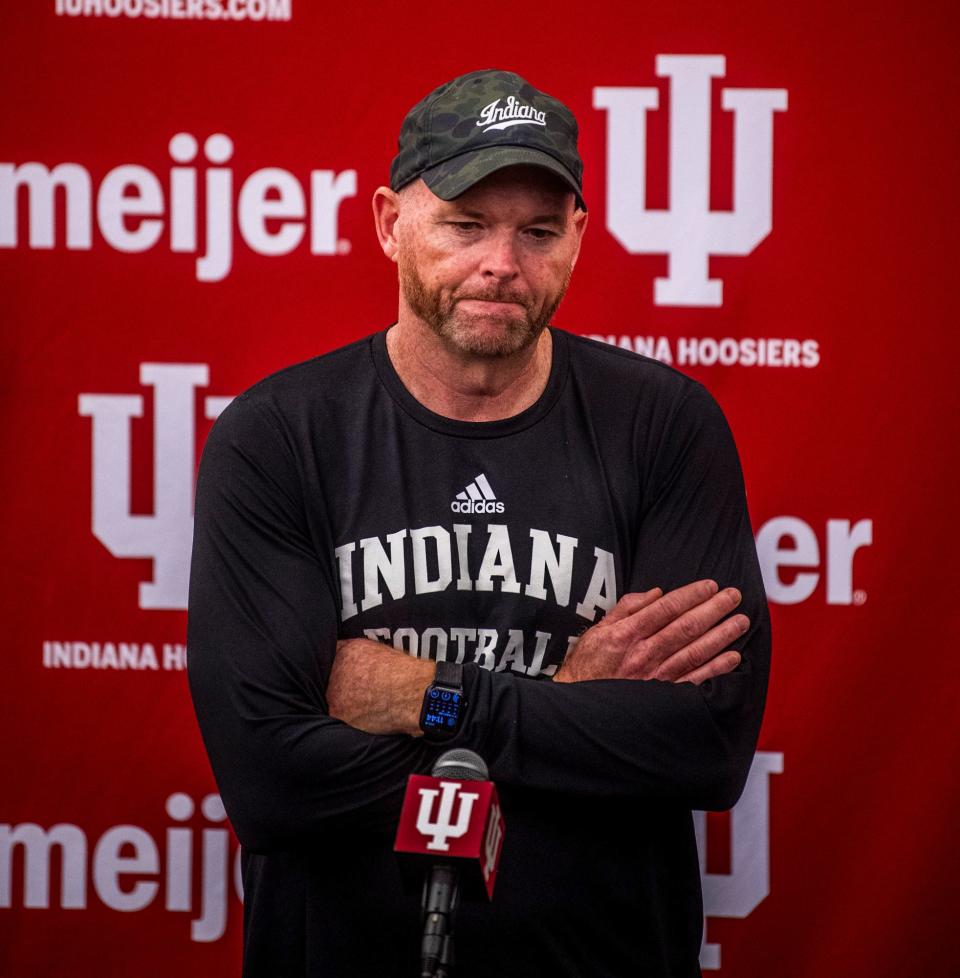Hoosiers' offense is a mess. So Rod Carey gets IU's largest assistant coach deal to fix it.
BLOOMINGTON – In an extraordinary bet on his ability not just to fix its flagging offense, but build it back into a robust, productive unit moving forward, Indiana is making former Hoosier Rod Carey its highest-paid coordinator in program history.
According to the terms of a memorandum of understanding (MOU) dated Wednesday and obtained by IndyStar on Friday, Carey will receive $815,000 per year on a contract that runs Oct. 2, 2023-Dec. 31, 2025. That timeframe puts him in line with three Indiana assistants — Kasey Teegardin, Paul Randolph and Craig Johnson — who saw their two-year deals auto-renewed this summer. Offseason hires Matt Guerrieri and Anthony Tucker also have contracts through 2025.
Carey’s deal will pay him $400,000 annually in base salary, and $415,000 in what IU contracts term outside, marketing and promotional income. Both numbers will stay static through the terms of the contract, per the MOU.
How Rod Carey hopes to fix IU offense: 'No time to make drastic changes.'
Their combined number makes Carey the program’s highest-paid assistant coach ever, his annual guaranteed compensation pushing slightly past the $800,000 IU paid Kalen DeBoer across his one year in Bloomington.

Like DeBoer, Carey also enjoys bonuses more directly related to offensive performance than purely to general team success. For example, if the Hoosiers score 30 or more points in at least 60% of their games across a full season, Carey would make an extra $100,000. If they managed 24 or more points in the same span, Carey would receive a $50,000 bonus.
For context, in the most basic possible terms, if Indiana had scored 24 points in each of its first five games this season, the Hoosiers would be 4-1.
There are similar bonuses for the Hoosiers’ finish in points per game in the Big Ten. A top-third finish in the conference in scoring offense would also net an extra $100,000, and a top-half finish $50,000. Similarly, a top-third finish in the Big Ten in average yards per game would make Carey another $100,000, while a top-half finish would also yield $50,000. There exists a similar provision for finishing top-third or top-half in the league in full-season red zone efficiency.
In other words, should Carey build a sufficiently robust offense in yards, points and red zone performance, he would become Indiana’s first-ever million-dollar coordinator, a mark DeBoer approached in 2019 but did not quite surpass.
Whole-team achievement bonuses in Carey’s contract slant heavily toward the postseason. He would receive $20,000 if the Hoosiers reach six wins, but the next wins-based bonus is only triggered if Indiana wins the Big Ten championship game. Incentives escalate from there for College Football Playoff performance.
All incentives are non-cumulative, the highest applicable bonus awarded under each provision. IU would be required by the agreement to pay out all bonuses by Feb. 15 of the following year.
As is standard for football assistants, Carey’s contract includes a series of benefits including healthcare, retirement, a courtesy car, meals at athletics’ dining facility and a $2,000 annual allowance to spend on adidas product.
In the event Indiana wanted to buy out Carey’s contract and fire him without cause, the department would owe him 100% of remaining guaranteed (base pay and OMPI) compensation across the life of the contract. That severance would be offset by any income Carey added were he to take another job elsewhere.
In the event Carey were dismissed as a result of the firing of the head coach (in this case Tom Allen), Indiana would owe Carey 100% of remaining guaranteed compensation through June 30 following the head coach’s termination. For example, if Allen were let go in January, IU would owe Carey severance equal to 100% of his guaranteed compensation through the end of June of the same year.
Should Carey wish to terminate his contract, he would owe Indiana 20% of one year’s salary were he leaving for an out-of-conference coordinator or assistant-coaching position, and 30% of one year’s salary if said position were elsewhere in the Big Ten. That buyout would be waived if less than 12 months remained on Carey’s contract at the time of termination, or if Carey were leaving either for a head-coaching job in college or a coaching position in the NFL.
All aforementioned terms laid out in the memorandum of understanding serve as highlights of Carey’s forthcoming contract, an MOU essentially serving as its precursor. MOUs set forth the key terms of a contract so an employee may begin operating under its most basic provisions, while the final details of the full deal are ironed out.
Follow IndyStar reporter Zach Osterman on Twitter: @ZachOsterman.
This article originally appeared on Indianapolis Star: Rod Carey is highest-paid assistant coach in Indiana football history

